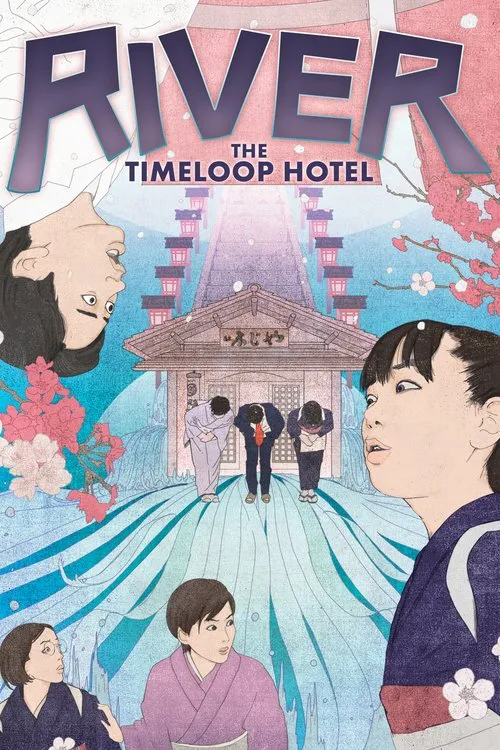River

Intrigue
Mikoto is a young woman in her early 20s, working at the 100-year-old Fujiya inn in a quiet region of Kyoto. She is a gentle soul, deeply rooted in her work and the traditions of the inn, which her family has run for generations. On the day that the story begins, Mikoto takes a moment to herself to stand in front of the Kibune River, situated at the back of the inn. She has been called back to work to prepare for the lunch service, but for some reason, she finds herself inexplicably drawn back to the river, where she had been just moments before. As the story unfolds, Mikoto begins to notice that strange things are happening. Every time she is called back to work, she finds herself back at the Kibune River, with exactly two minutes passing between each occurrence. She tries to make sense of this phenomenon, but it seems to be happening without any discernible pattern or explanation. At first, the loop seems to be a minor inconvenience, but as the day wears on, Mikoto starts to feel trapped and bewildered. She tries to adjust her routine, changing her actions and her words in an attempt to break the cycle, but to no avail. The loop seems to be stuck on repeat, and Mikoto is powerless to escape it. As she navigates this strange phenomenon, Mikoto begins to notice other aspects of the inn and the people around her that seem to be stuck in the loop. Some of the guests, who had checked in earlier in the day, repeatedly take the same seat by the window, ordering the same food and drinks with the same conversation. The inn's staff, too, are subject to the loop, with some characters repeating the same actions and conversations with an eerie consistency. Despite the chaos and disorientation caused by the time loop, Mikoto tries to maintain a sense of order and routine. She keeps track of each repetition, noticing small changes and patterns that might help her unravel the mystery behind the loop. Her efforts are motivated by a sense of responsibility to the inn and its customers, as well as her own growing sense of curiosity and frustration. As the loop continues, Mikoto begins to piece together a narrative, trying to understand what might have caused the phenomenon and how she might break free from it. She considers various theories, from supernatural forces to the power of her own subconscious, but nothing seems to make sense. Each iteration brings new clues and insights, but also new obstacles and challenges that make it increasingly difficult for Mikoto to hold on to hope. Throughout the loop, Mikoto maintains a deep connection to her surroundings, observing the subtle changes in the weather, the sounds of the river, and the behavior of the guests. Her awareness of the world around her becomes almost hyper-vigilant, as if she is constantly scanning for clues and patterns that might reveal the mystery behind the loop. As the repetitions continue, Mikoto begins to question the nature of reality itself. If this loop is a product of her own mind or the result of some external force, does that mean that reality is a fluid, ever-changing concept? Can we truly know what is real and what is just a product of our perceptions? Mikoto's struggle to escape the loop becomes a metaphor for her own search for meaning and purpose in life. Ultimately, the loop drives Mikoto to confront her own desires, fears, and values, challenging her assumptions about herself and her place in the world. Can she use this experience to tap into an inner reservoir of creativity, courage, and wisdom? Or will the loop ultimately break her, forcing her to abandon her dreams and conform to the expectations of others? In the midst of this existential crisis, Mikoto begins to develop a deep empathy for the people around her, who are also trapped in this loop. She starts to see the world through their eyes, and in doing so, she gains a new appreciation for the intricate web of relationships that bind them together. The inn becomes a microcosm of society, with its complex web of power dynamics, social hierarchies, and emotional currents. As the loop continues to repeat, Mikoto's connection to the inn and its customers grows, transcending the boundaries of time and space. She starts to see the past and the future in terms of interconnected experiences, not separate, distinct moments. Her perspective expands, and she begins to understand the fluid nature of reality, where the present moment contains all the past, present, and future. With this newfound perspective, Mikoto's relationship with the loop transforms, and she starts to see it as an opportunity rather than a prison. She can adapt, respond, and grow with each iteration, rather than getting stuck in a fixed, reactive pattern. Ultimately, the experience becomes a transformative catalyst, revealing to her a new way of living, being, and experiencing the world. In the end, Mikoto breaks free from the loop, but not in the way she expected. With a deeper understanding of time, reality, and the human experience, she emerges from the cycle with a newfound sense of purpose and clarity. As she looks back on the past, she recognizes the loop as a turning point in her journey, one that has allowed her to transcend the boundaries of time and tap into the vast, interconnected web of human experience.
Critiques
Recommandations




